Villagers from drought-hit Sangli say they have no faith in local politicians
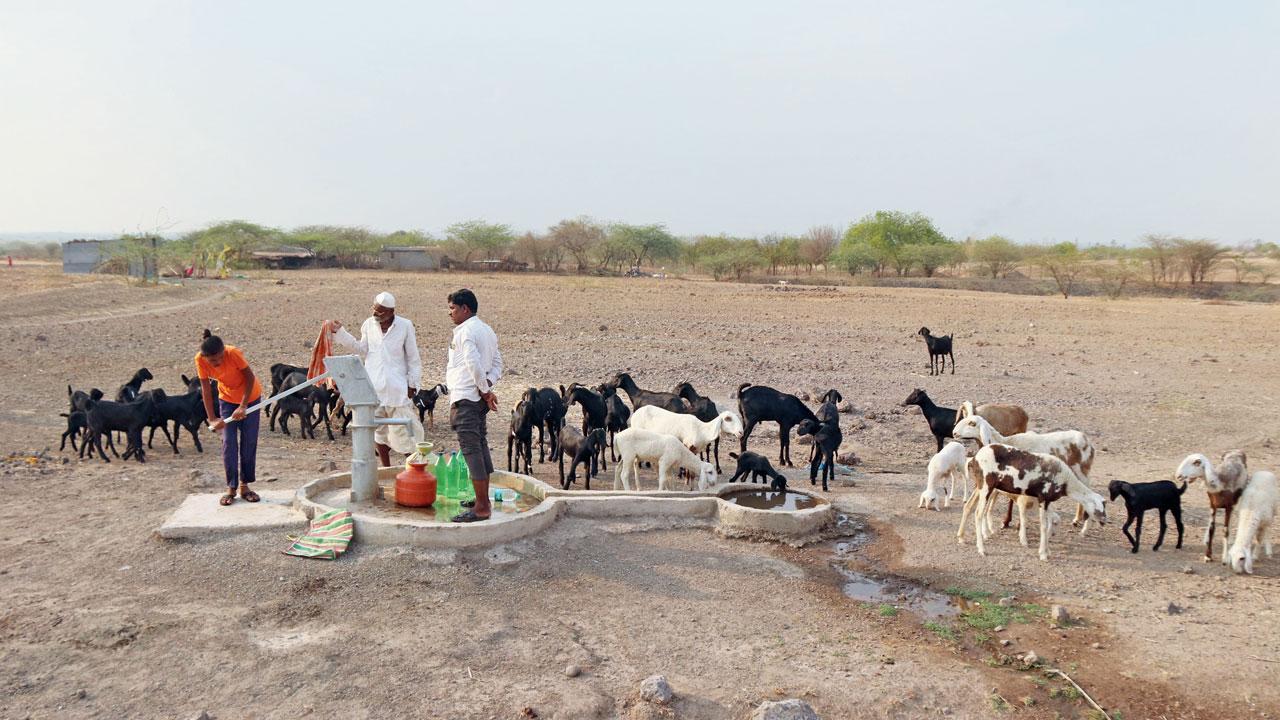
Goats gather around a borewell to drink water
As voting day approaches for the Sangli Lok Sabha constituency, Khandu Borgaonkar, a resident of Jalihalkhurd village in the drought-prone area of Jath taluka, Satara district, expressed a desire for his village to be included in Karnataka, citing a lack of attention from Maharashtra politicians. Speaking with mid-day, he said the situation is so bad that they have to travel 15-20 km each day to purchase drinking water. “Forget about water for farming.” As mid-day proceeded towards Jalihalkhurd village, it was a common sight to see a drum placed outside many households. This village stands out as one of the hardest-hit drought-affected regions along the Maharashtra-Karnataka border.
ADVERTISEMENT
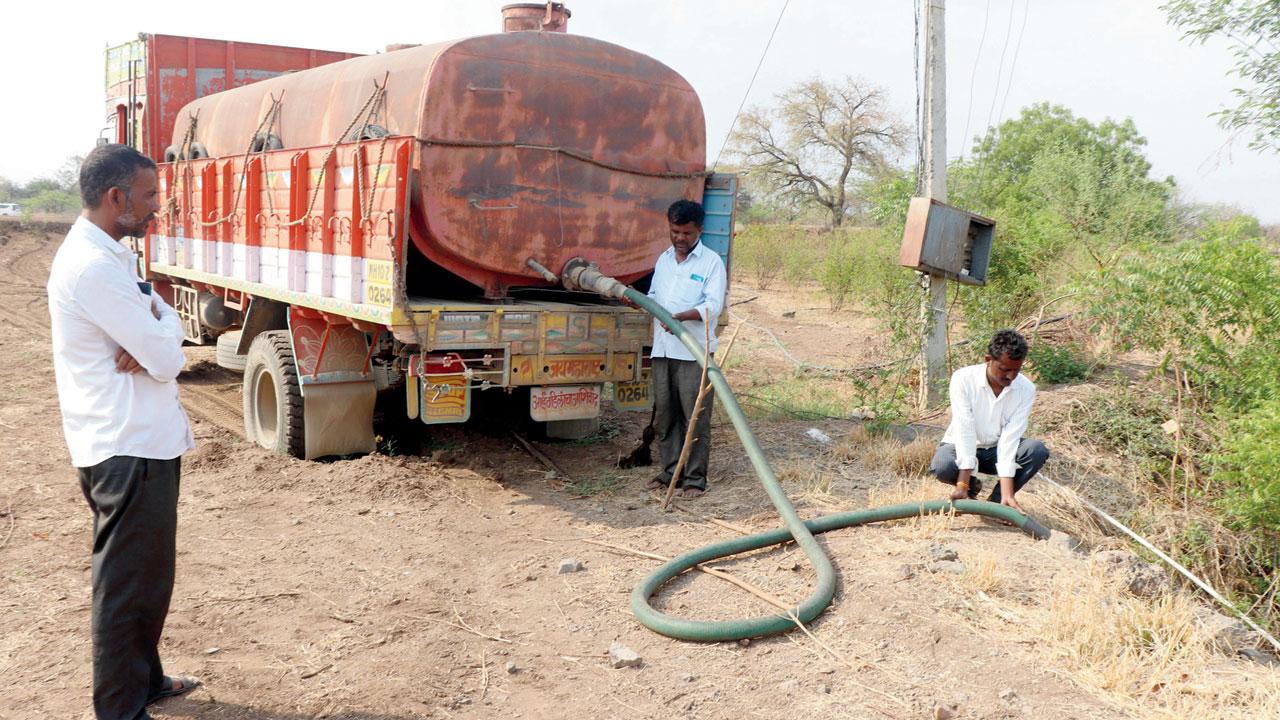
A tanker supplies water to Basavraj Jamgund’s farm. Pics/Anurag Ahire
Borgaonkar said, “In our village, the situation has deteriorated to the extent that we receive water through government-supplied tankers only once every ten days. The lack of assistance from the government or our elected representatives has left us feeling neglected. Many residents are considering relocation to Karnataka, where the government and politicians appear to be more committed to providing essential services to the people. While some politicians exploit the sentiment around Marathi language and pride, the crucial question remains: does this rhetoric effectively address the pressing issue of hunger faced by people affected by drought in our village?”
When asked about the villagers' water management for cooking and drinking, one of them showed an 18-litre water canister that they purchase daily from Daribadchi, a village located approximately 10-12 km away.
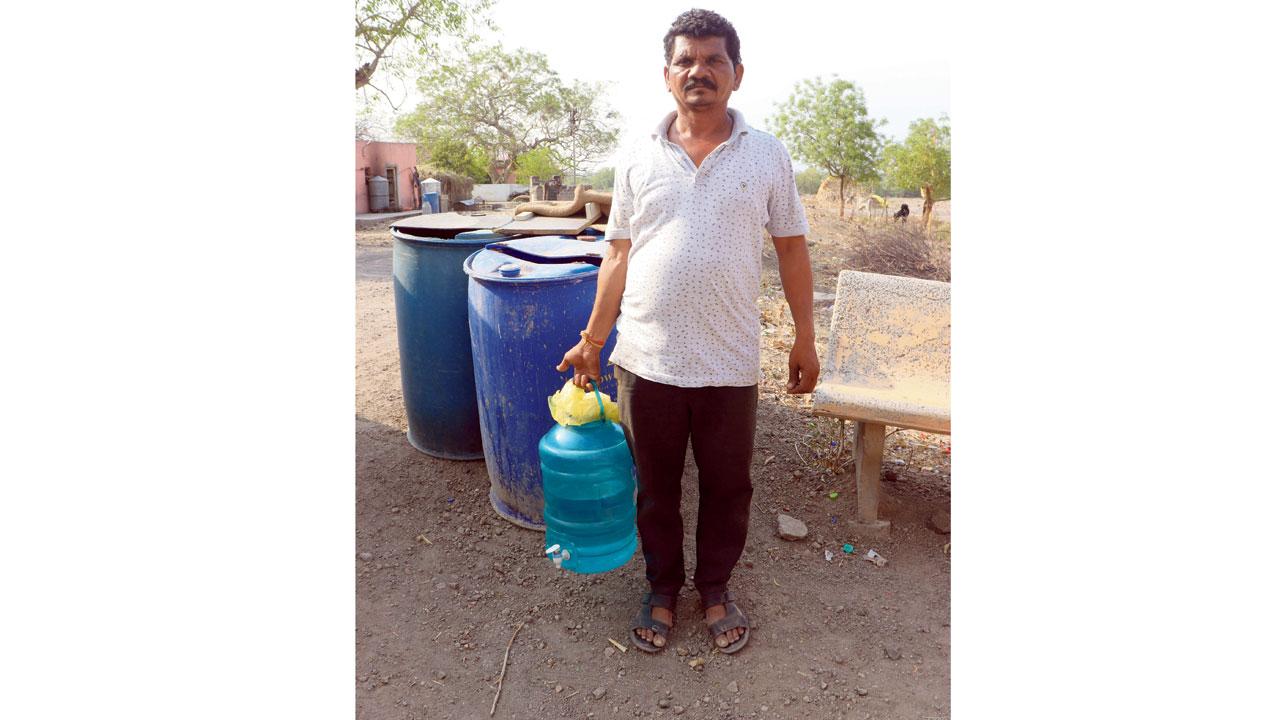
Khandu Borgaonkar carrying drinking water
“With a family of four, our daily need for cooking and drinking water amounts to approximately 20-30 litres. Every day, I travel 10-12 km each in each direction to purchase water. Each 18-litre jar, sourced from a private borewell, costs Rs 10, and I require two jars daily. Additionally, I spend Rs 50 on fuel for my bike. So I end up spending Rs 90 per day for drinking water alone, adding up to Rs 2,700 per month. The ongoing drought and reduced rainfall have depleted our income sources, exacerbating our already dire financial situation,” Borgaonkar added.
Further into the interiors of the village, the situation seems worse as the mercury rises. With the majority of the land barren and no water source in sight, the primary concern for the people is their livelihoods and income.
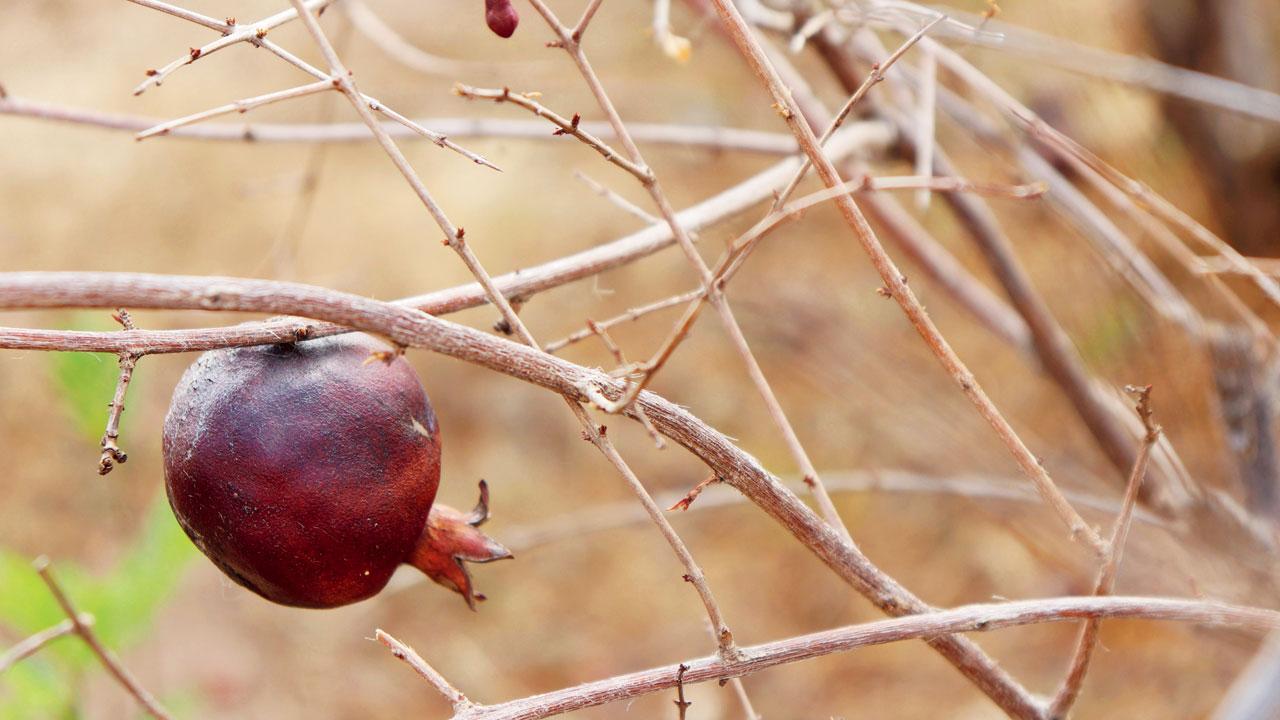
Fruits on trees have dried due to a lack of water
Another villager, Siddhapa Patil said, “In the absence of water for farming, I've incurred a loss of approximately R15 lakh due to my 4 acres of land being devoid of crops. The concern is that are the authorities and politicians in Maharashtra genuinely attentive to our plight. Their sporadic appearances in our villages during elections, followed by prolonged absences for five years, raise doubts.”
The decreasing groundwater level can be another reason for worry in future. During mid-day’s travel through Jath tehsil, it was observed that several individuals had borewells on their farms to extract groundwater. This water is then sold to buyers in Jath city, as well as to farmers who require water for their fruit crops such as pomegranates and grapes.
Villagers want to be part of Karnataka
There are 65 villages from the drought-prone Jath taluka that have demanded through the Pani Sangharsh Samiti to get included in Karnataka. These lie along the Maharashtra-Karnataka border and villagers have been alleging that the Maharashtra government and politicians from the area have not been doing anything to resolve the water scarcity issue.
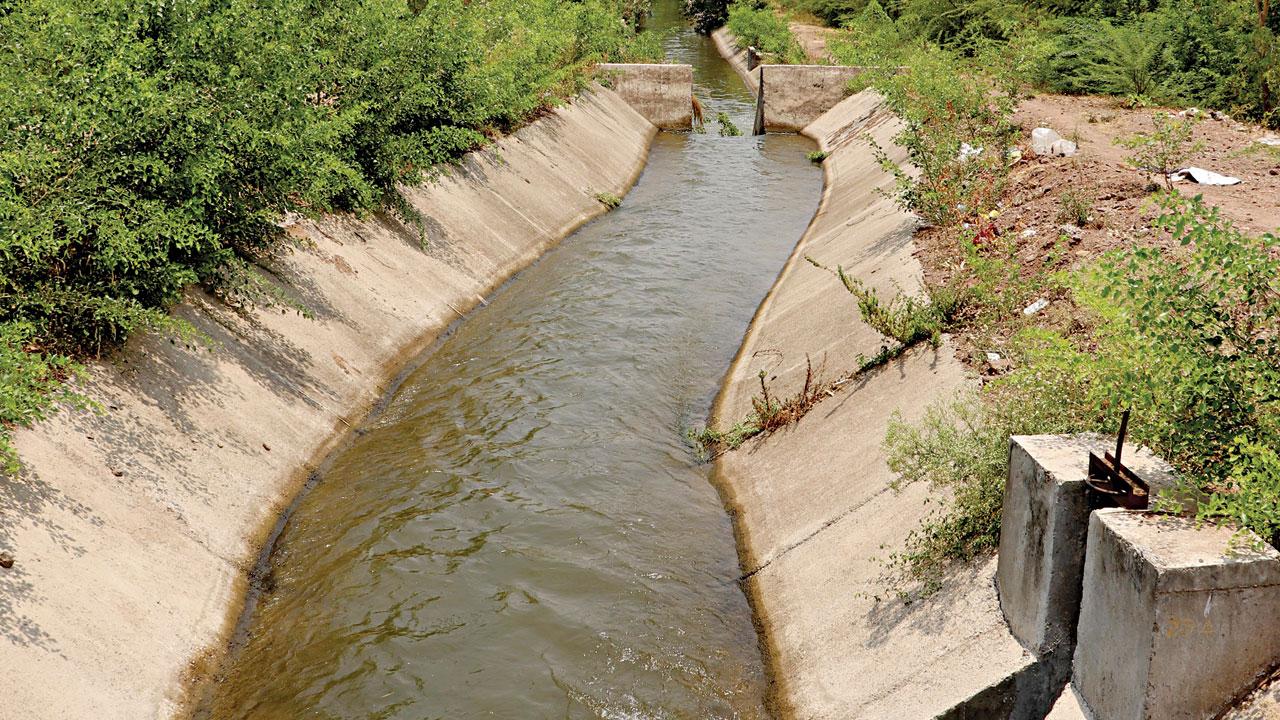
Water canal in Jath taluka
“We have been staying in Maharashtra for so many years and have been demanding for three decades to expand the Mhaisal lift irrigation scheme so that farmers in our drought-prone area benefit, but nothing has been done. We want our villages to be a part of Karnataka so that at least we get benefits from their government,” said Mohan Shinde from Khalti village in Jath taluka. Under the Mhaisal scheme, water from the Krishna River can be provided to the drought-prone villages of Sangli and Kolhapur for consumption and agricultural activities.
Jayshree Shejul from the Khalati village fears that in the coming years, the situation will get more serious. “It's imperative for the government to take prompt action as the water situation is becoming increasingly critical. While some farmers with borewells are selling water to neighbouring villages and even Jath city, the plight of economically disadvantaged individuals like us cannot be overlooked. Having to trek kilometres for drinking water not only poses health risks but also exacerbates our already challenging circumstances.”
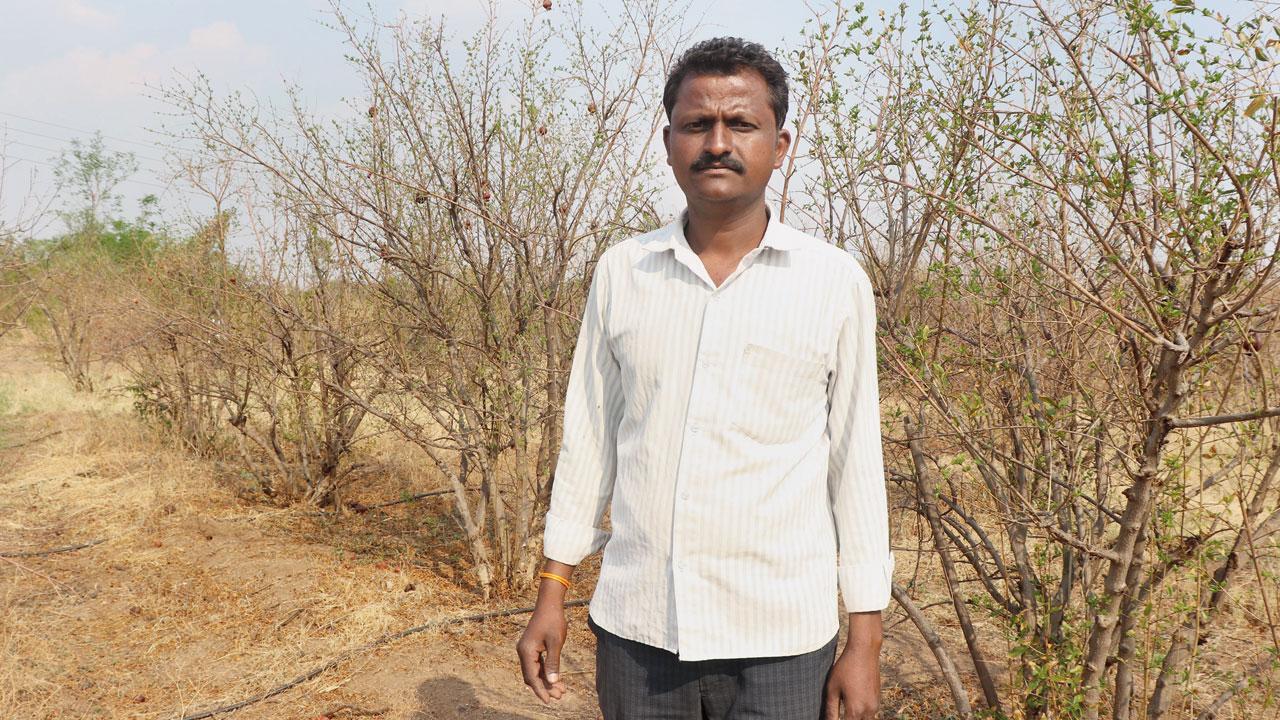
Jamgund at his pomegranate farm in Dharibadchi village
Dry farms, losses to farmers
During the visit to the Jath area, a water tanker was seen going towards a village. The driver said he was supplying water to a private farm. As mid-day followed the water tanker, we reached a farm growing pomegranates. We noticed that the fruits on the trees had dried up. The owner of the farm said he was trying to keep the pomegranate and grapes crop alive so he could earn some income in the coming year.
“I have invested around R15-20 lakh on the pomegranate and grape crop but the entire amount is going to go down the drain as there is no water in our taluka. The entire pomegranate crop is drying and so is the grape farm. Every alternate day, I have to pay Rs 800 for the tanker so that I can empty the water in my well and later use it for the crops. Political leaders and representatives are just not bothered or else they would have done something to bring water to the drought-prone villages in this region. Villagers in this belt want their villages to be included in Karnataka as we have no hope from the politicians in Maharashtra,” Basavraj Jamgund said, adding that.
“Around 47 villages in our taluka are dependent on private water tankers for crops. The situation for drinking water is even worse and we have to purchase filtered water canisters,” he added.
 Subscribe today by clicking the link and stay updated with the latest news!" Click here!
Subscribe today by clicking the link and stay updated with the latest news!" Click here!







